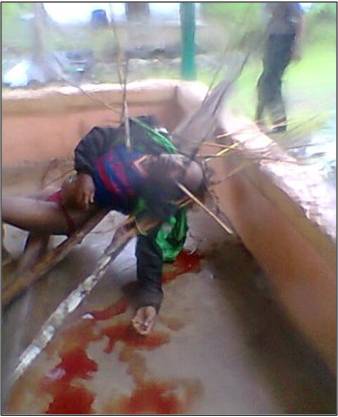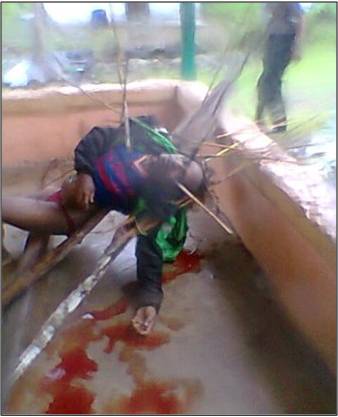Open Letter/ Statement from Simeon Dabi, Chairman of KNPB Baliem
October 15, 2012
On September 20 2012, I, Simeon Dabi, Head of the KNPB (National Committee for West Papua), was in Jayapura and received a telephone call from Kasat Reskrim Agus Supriadi Siswanto about bombings that occurred in two places: a Traffic Police Post at Irian street, Wamena and at the Jayawijaya Province Parliament Building. I was urged to immediately come to Wamena. On the 27th of September I received another telephone call urging me to quickly come to Wamena about the bombing case there. I arrived in Wamena on Friday September 28th, 2012, and when I arrived at Wamena airport I directly headed to the Jayawijaya Traffic Police Post so that I could become a witness to the treason charges against two of my colleagues, Enos Itlay and Semi Sambom who were arrested on July 1st 2012 related to possessing an OPM (Free Papua Movement) document.
Once I arrived at Jayawijaya Police District Command, I immediately met with Kasat Reskrim Agus Supriadi Siswanto in his office. I was asked many questions about the treason case against my two colleagues, then forced to become a witness for my two colleagues from 11:09-15:27 WPB. I was asked a number of questions including: “Where is the KNPB Secretariat at the moment?” to which my answer was that the KNPB does not yet have a clear secretariat; “What is the total number of KNPB members?” to which my answer was the entire Papuan society; “Does the KNPB wish to separate itself from the United Republic of Indonesia?” to which my answer was the KNPB is a medium for the people and the people will decide.
After this I went home. One day later, on Saturday 29th September 2012, at 5:15pm. The Traffic Police together with Densus 88 troops carried out a sweep and ambush of the KNPB secretariat of the Baliem-Wamena Region with goals that are not clear. In my opinion, the sweep of the KNPB secretariat was done because from the time of the bombing until when I arrived in Wamena, officers had not been able to find the bombers, due to the fact that Kasat told me last time that they will give imbalah (poss. transl. money to God?) to find the bombers.
Until now I am deeply surprised and do not believe that the sweep carried out by police officers found homemade bomb materials in the KNPB Baliem-Wamena Secretariat office – it is not true!! This is proof that the police were not able to find the bomber, so the KNPB were framed by the Jayawijaya Chief of Police. It is a political scenario to frame West Papuan civil society, especially people in the central highlands of West Papua.
Sweeping and arbitrary arrests of civilians by the Military/Jayawijaya Police occurred in places including Kurulu district, Wosi and Kimban district on Sunday 30th September 2012, at 5:00am Papuan time.
From then until now, the Military/Jayawijaya Police are carrying out pursuits and arrests of all KNPB members, even KNPB people throughout the entire Central Highlands region of West Papua, and are entering into villages.
From the brief description above, as head of the KNPB Baliem-Wamera, I have several concluding questions:
- Why was I, head of KNPB Wamena, made to immediately come from Jayapura in relation to the Wamena bombing case?
- What is my connection to the bombings that occurred in Wamena whilst I was in Jayapura?
- Why upon my arrival at Wamena did Kasat of Jayawijaya Police force me to search for the bomber?
- After I was interrogated at Jayawijaya police, one day later Jayawijaya Police District Command carried out sweeps at the KNPB Baliem-Wamena Secretariat. How and from where did police get an explosive?
- Are Papuan people, particularly people of Wamena, capable of designing/creating a homemade bomb?
Conclusion:
The Military/Police have created a political scenario in order to frame the West Papua National Committee (KNPB) Baliem-Wamena with a criminal offence. Police are the main troublemakers in Wamena, the Wamena bombers are themselves actors of state security forces. (emphasis added by WPM)
Police officers of the Republic of Indonesia: Why does a united nation need national security? Police are security for the United Republic of Indonesia. In simple language, police are often called ‘security’. Police are often also called troublemakers in situations of national security?? Is the role and function of Indonesian Police as security or troublemaker?? Especially throughout all parts of West Papua, police are vandals of national security that always act outside the procedure/law of the United Republic of Indonesia.
Simeon Dabi is currently being held in the Jayawijaya Police HQ prison in Wamena and there are grave fears for his safety, his access to legal representation, and the likelihood of a fair and impartial trial.
Related articles
- TPN denies involvement in “unknown persons” terror plot in Wamena (westpapuamedia.info)
- Australian-funded anti-terror troops conduct raid (pacific.scoop.co.nz)
- Wamena arrests as Australian-funded anti-terror troops conduct raid amid increasing repression on KNPB political activists (westpapuamedia.info)
- KNPB pleads for international security (force) to prevent ongoing conflict in Timika (westpapuamedia.info)
- 7.30 Report (ABC): West Papua arrests highlight Australian Detachment 88 links (westpapuamedia.info)
- West Papua arrests trigger fresh Australian Detachment 88 link allegations (pacific.scoop.co.nz)
- KNPB ask police to prove what charges were against Mako Tabuni (westpapuamedia.info)
- KNPB urge police to stop brutality against Papuans (westpapuamedia.info)
- KNPB: Buchtar Tabuni should be transferred to hospital for medical treatment (westpapuamedia.info)
- Detachment 88 implicated in new activist crackdown (abc.net.au)





